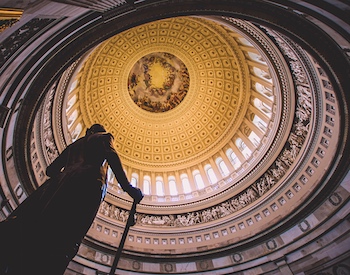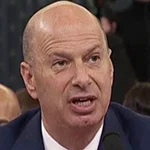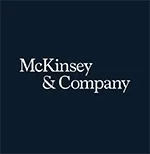The coronavirus (COVID-19) pandemic has decimated the U.S. economy. The public health crisis has resulted in stay-at-home orders in more 40 states with mandates forcing all nonessential businesses to close. The result, to date, is 22 million unemployed, record-low retail sales for March and countless businesses in danger of shuttering, if they haven’t already.
The U.S. Department of Homeland Security in March issued an advisory list, identifying workers across a range of operations and services—including everything from healthcare and telecommunications employees, to transportation and logistics, food and agriculture, law enforcement, defense, groceries and pharmacies, among others—that it deems essential to keeping the country on life support.
In response, companies of all stripes have hired K Street lobbying firms in the hopes of convincing lawmakers that they too should be classified as “critical infrastructure” under DHS guidance in the hopes that they can keep the lights on during the pandemic.
These developments come on the heels of several high-profile cases where companies willfully defied shelter-in-place orders amid the outbreak. Conservative arts and crafts chain Hobby Lobby flouted states’ shutdown mandates, initially making the flimsy argument that it was an “essential business” before legal action threatened by attorneys general in several states convinced the retailer to close all remaining stores and furlough most employees. Video game/consumer electronics retailer GameStop drew ire when it attempted a similar standoff with local authorities by suggesting its services constituted “essential retail.”
Lobbying registration documents filed with Congress in March and April reveal that, in many cases, companies’ efforts to gain “essential” designation seem discretely reasonable based on the type of work they do. Like the Hobby Lobby and GameStop instances, however, other recent Lobbying Disclosure Act Database filings suggest that what constitutes an “essential” business is, for better or worse, open to interpretation.
‘Essential,’ essentially
Laundry equipment supplier Laundrylux signed an agreement with Donald Trump-connected Ballard Partners in a bid to receive “designation as essential business in response to COVID-19 virus,” according to April lobbying registration documents. Inwood, NY-based Laundrylux, which was founded in 1955, supplies coin-operated washing machines and dryers for laundromats and residential laundry facilities.
 |
Insurance giant Fidelity National Financial also inked a pact with Ballard Partners in the hopes that the Jacksonville, FL-based holding company—which specializes in title insurance and mortgages—can be deemed an “essential service” during the pandemic.
Hunter Douglas, the Dutch corporation best known for its line of high-end window shades, retained law firm Bracewell (formerly Bracewell and Giuliani) in April to lobby for the company’s place in “essential and critical infrastructure.”
Solar panel manufacturer JinkoSolar pitched the Department of Energy as well as Congress to request that “factories of solar modules be included as essential services.”
Events and workspace provider Convene retained government relations firm the Petrizzo Group to advocate for government policy as it pertains to “company economic and workforce issues.” The New York-based flex meeting, event and office space company was recently forced to lay off about 150 employees—nearly a fifth of its workforce—in the wake of the coronavirus outbreak.
Oil field services giant Baker Hughes Company, which was recently forced to lay off more than 200 workers in Oklahoma due to the crash in oil prices resulting from COVID-19, registered to lobby Congress so that it could make its case for “issues related to the designation of critical infrastructure and essential businesses.”
Greensboro, NC-based textile manufacturer and distributor Elevate Textiles, which makes threads and fabrics for the fashion, apparel and footwear industries as well as the home furnishings, military and medical sectors, hired trade law firm Sandler, Travis & Rosenberg, P.A. in late March to grant the company “essential facility designations in any Shelter in Place orders.”
Lynchburg, VA-based transformer manufacturer Delta Star, Inc. has turned to lobbying outfit JMH Group (formerly Jamian Mcelroy & Hamlin) to maintain operations with an “essential businesses” designation during the pandemic.
England-based consumer goods maker RB hired Klein Public Affairs to convince the Dept. of Health & Human Services that the company’s health, hygiene and home products are defined as essential.
Trade groups storm Capitol Hill
If U.S. companies seem to suggest in their recent lobbying efforts that “essential” is a fungible term, it deserves to be mentioned that they aren’t alone. Trade groups representing every industry and service imaginable are handling the COVID-19 crisis by taking to Washington to make the case for why the member companies they advocate for should be added to the list.
The American Chiropractic Association filed lobbying registration documents in April for its intent to reach out to the Department of Homeland Security in an effort “to ensure chiropractors are deemed essential during the COVID-19 crisis.”
The Forging Industry Association, the trade group comprised of more than 200 North American metal forging producers and suppliers, tapped Mehlman Castagnetti Rosen & Thomas for help advocating that its workforce “be characterized as ‘essential’ under uniform national CISA standards.”
The Transportation Alliance, the trade group that advocates for the private passenger transportation industry—which includes taxis, limousines, airport shuttle fleets and non-emergency medical transportation—hired government affairs firm Miller-Wenhold Capitol Strategies to ensure that ground transportation is defined as an essential service.
The American Traffic Safety Services Association, the trade group dedicated to advancing roadway safety, registered to lobby Congress so that it could advocate “for the manufacturers and installers of roadway safety infrastructure devices to be deemed as essential under the DHS CISA guidance, during COVID-19.”
Gun group the National Shooting Sports Foundation, the trade association that represents firearms manufacturers, distributors and dealers as well as shooting ranges, penned a letter to the Department of Homeland Security requesting that the agency designate the firearm and ammunition industry and the employees who work in that sector “National Critical Infrastructure.”
A coalition consisting of the leading U.S. automobile dealer trade groups—including the National Automobile Dealers Association, American International Automobile Dealers Association, Alliance for Automotive Innovation, National Association of Minority Automobile Dealers and American Truck Dealers—sent a letter to President Trump in late March, requesting that car dealerships be covered by DHS/CISA guidance as “critical infrastructure” during the COVID-19 pandemic.
The Securities Industry and Financial Markets Association, which represents securities firms, banks and asset management companies, submitted a letter to the nation’s governors claiming that financial services firms and their employees are “critical to maintaining financial market operations,” and should therefore “be deemed essential.”
Tree trade groups the Tree Care Industry Association and the International Society of Arboriculture submitted a joint letter suggesting that arborists and tree care companies “meet the definition of ‘essential business’ given the fact that,” their “services directly protects[sic] the safety of the public and the safe operation of buildings and residences.”
The Council for Responsible Nutrition, the trade association for the dietary supplement industry, similarly sent a letter to the country’s governors requesting that dietary supplement companies be added to the list of “critical infrastructure” alongside food and healthcare product manufacturers.
A road map back to normal
Trump yesterday revealed new federal guidelines for restarting the U.S. economy, a gradual, multi-phased approach that defers to governors a state-by-state plan for reopening businesses, schools and everyday life, depending on the circumstances of each state. Trump said that plan could have some states reopening “literally” tomorrow.
Getting ahead of the President, multiple cities yesterday—including New York, Los Angeles and Washington, D.C.—extended their stay-at-home orders until at least May 15. With the restart to states’ economies left at governors’ discretion, protests have erupted in several states—notably, in Michigan, Minnesota and North Carolina—with demonstrators demanding that leaders put an end to commerce and business restrictions and allow residents to get back to work.
In the meantime, several recent developments suggest that the process of being declared an “essential” business might be easier than it seems—at least if you know the right people. In what’s possibly the most bewildering twist of all, professional wrestling promoter World Wrestling Entertainment on Tuesday was deemed an “essential” business by the state of Florida, allowing the company to continue taping live events from its Orlando facility, albeit without an audience present.
The next day, WWE CEO Vince McMahon was named among the business leaders tapped to serve in an advisory group assembled by the White House to help restart the U.S. economy. McMahon’s wife, Linda McMahon, chairs pro-Trump SuperPAC America First Action. Last week, that SuperPAC announced a $26.6 million investment in pro-Trump advertising in battleground states from Labor Day through Election Day.


 Missy Edwards Strategies represents Shein Technology Group, the Los Angeles arm of the embattled Singapore-based “instant fashion” retailer.
Missy Edwards Strategies represents Shein Technology Group, the Los Angeles arm of the embattled Singapore-based “instant fashion” retailer. Carlsbad, a north San Diego County city of 115K people, is looking for a firm to provide government relations and Sacramento lobbying services.
Carlsbad, a north San Diego County city of 115K people, is looking for a firm to provide government relations and Sacramento lobbying services. Gordon Sondland, who was US ambassador to the European Union under Donald Trump, has registered as a representative of Ukraine’s cabinet and ministers.
Gordon Sondland, who was US ambassador to the European Union under Donald Trump, has registered as a representative of Ukraine’s cabinet and ministers. The Daschle Group is representing Santa Monica-based Stand with Hong Kong Action, an advocacy group that fights to end Chinese repression in Hong Kong.
The Daschle Group is representing Santa Monica-based Stand with Hong Kong Action, an advocacy group that fights to end Chinese repression in Hong Kong. McKinsey & Co. has reached out to Republican shop Harbinger Strategies to educate policymakers about the activities of the embattled management consultancy.
McKinsey & Co. has reached out to Republican shop Harbinger Strategies to educate policymakers about the activities of the embattled management consultancy.


 Have a comment? Send it to
Have a comment? Send it to 
No comments have been submitted for this story yet.